How does the Kenyan round bean coffee exist? introduction to Kenya round beans in Sassini
For Qianjie, there is no denying Kenya's importance and efforts in the coffee industry. As a well-known coffee producer in Africa, the history of coffee cultivation is much more complete than that of Ethiopia next door, but with their own efforts and efforts, they have turned the coffee industry into the country's main source of income. This is amazing. Today, I'm going to talk about coffee in Kenya.
Geography of coffee cultivation in Kenya
Kenya is located in eastern Africa. This equatorial country with high altitude and savanna climate, with abundant Rain Water and soil rich in mineral nutrients, creates a great growing environment for coffee trees. Among them, the content of phosphate rock in the soil of Kenya is higher, and the phosphate Kenyan coffee bean has this higher acid quality.
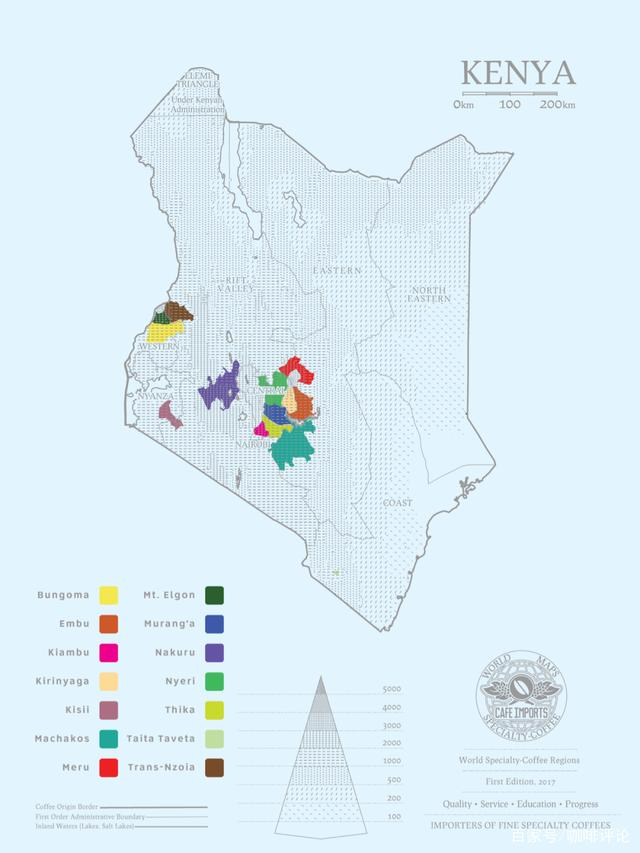
The average altitude of Kenyan coffee beans is 1500-2100m. The temperature difference between day and night is large. The highest temperature during the day is 22-26 ℃ and the lowest is 10-14 ℃. This cold condition slows down the ripening rate of coffee fruit and gives more time to form more flavor.
Coffee cultivation in Kenya
Kenyan coffee was grown on the island of Reunion in 1893, when coffee agriculture was colonized and officially controlled by the British at that time. It was not until 1935 that Kenya began to have its own management rights. Before that, the local people worked for British slaves. At first, the bourbon variety was grown in Kenya, and then after 1935, people began to grow the Scott laboratory's SL28 and SL34 coffee varieties, which are easy to grow, large bean shape, high yield and good flavor.
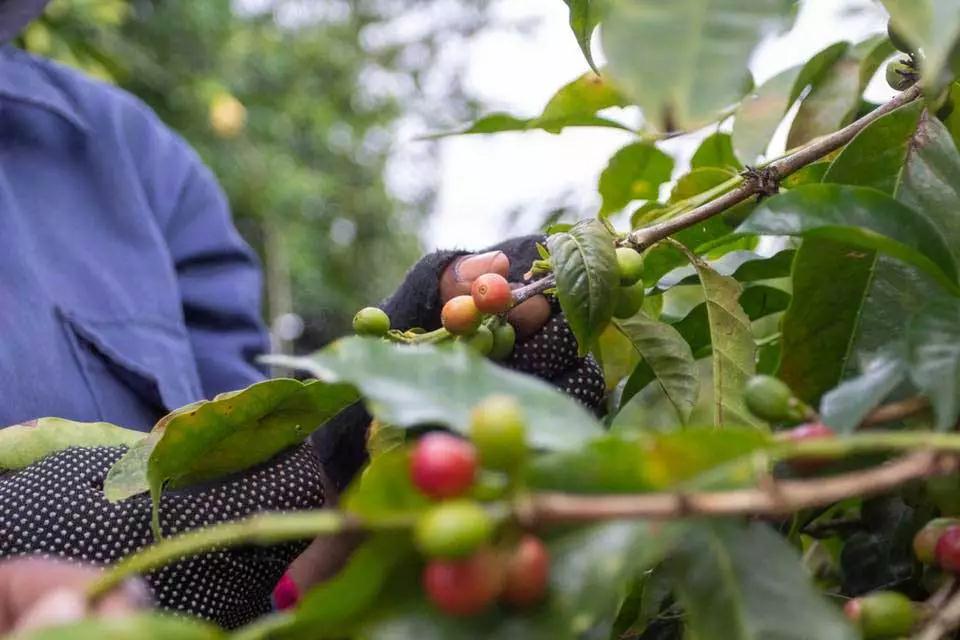
SL28 and SL34 coffee varieties
SL28 was first established in the 1930s by the newly established Scott Labs commissioned by the Kenyan government to select the varieties suitable for the country. 42 primary varieties were numbered and screened one by one, and finally found that SL-28 and SL-34,SL28 originated from Bourbon, and SL-34 originated from iron pickup, which are not a series of varieties. At the beginning, the goal of breeding SL28 was to produce a large number of coffee beans with high quality and resistance to diseases and insect pests, but in some producing areas, the goal of breeding was mainly high yield and disease resistance, without considering disease resistance.
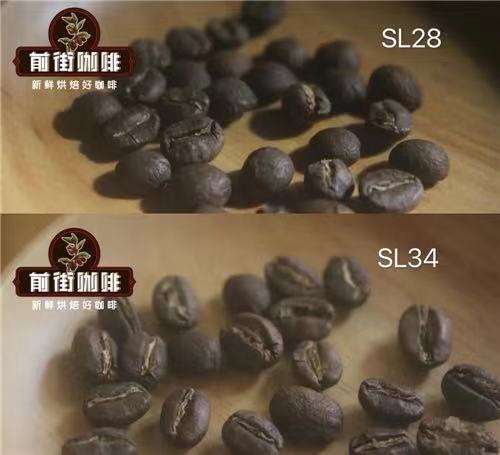
Thanks to the bourbon gene, although the later SL28 yield was not as expected, the copper leaf color and broad bean-shaped beans have great sweetness, balance and complex flavor, as well as significant citrus and black plum characteristics. SL34 is similar to SL28 in flavor, with a softer and cleaner finish than SL28, except for its complex acidity and great sweetness. SL34 has French missionaries, bourbon, and more Ironka lineage. The appearance of beans is similar to that of SL28 and is more suitable for rainforest growth.
The most common difference between the grades of Kenyan coffee
Kenyan coffee is screened through a specific sieve, and the grade of coffee beans is determined by the size of the coffee fruit. The AA grade represents the full size of the coffee, which needs to be in 17mur. the washed coffee beans of the Asaria processing plant in Kenya sold on the front street belong to the AA grade, and the coffee particles look plump and uniform. The AB grade represents a coffee size of 15 Murray 16 mesh, which allows 10% to be under 15 mesh, but it is not directly related to the actual quality.
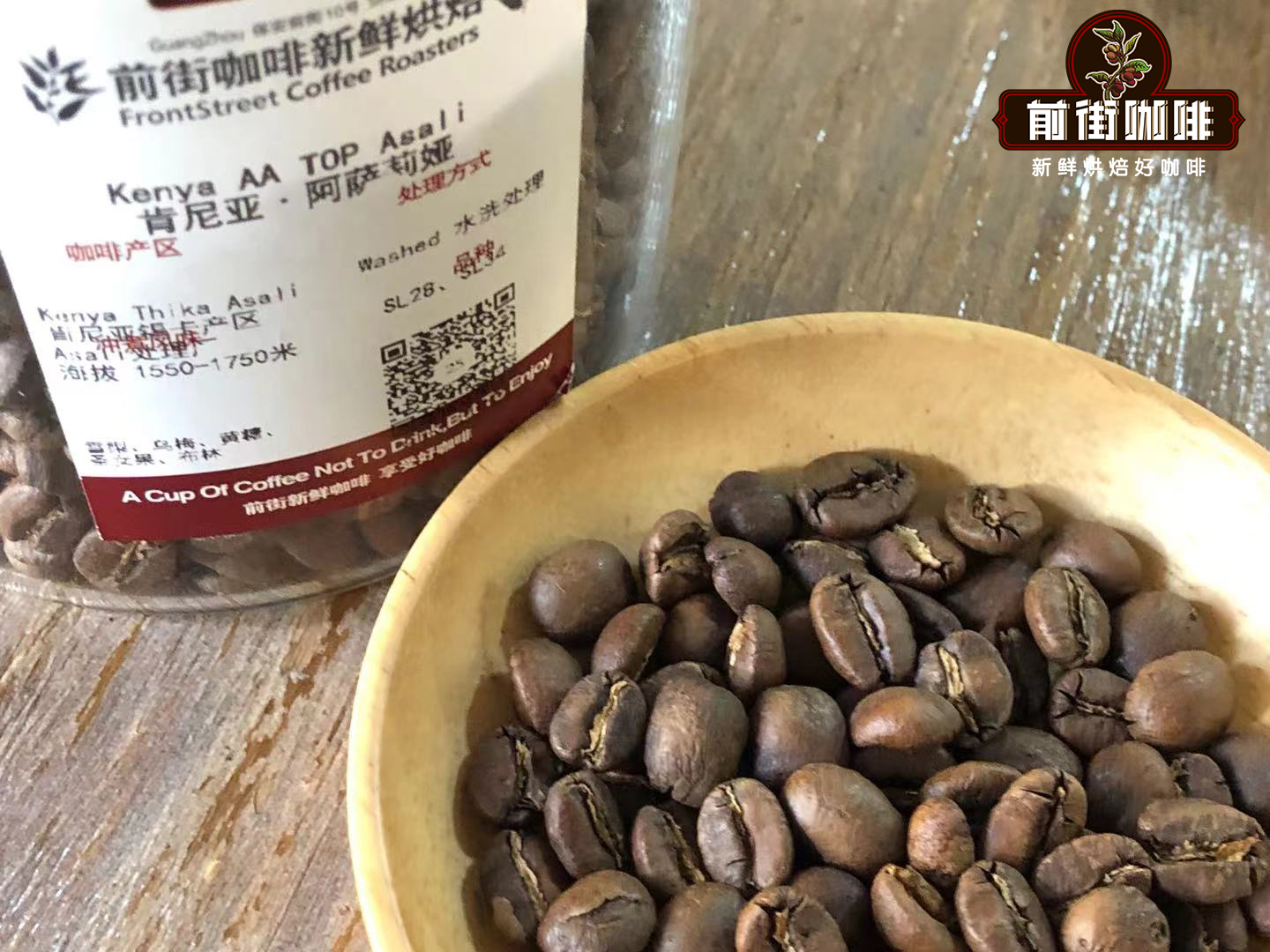
The Kenya Coffee Bureau's research, development and quality management of coffee is very strict, and it indirectly helps hard-growing coffee farmers through an excellent auction system to increase the price of coffee beans. And through agricultural education, coffee farmers are increasingly updated and improved their planting techniques to produce better coffee. Kenya, with a particularly strong sour taste of BlackBerry fruit, produces less coffee. These coffee beans are excellent coffee farms acquired by raw coffee bean merchants.
What are Kenyan PB coffee beans?
Coffee beans are usually made up of two peas (commonly known as mother beans), while PB beans are in the shape of growing rice or oval (commonly known as male beans) Broog there is a photo comparison, Kenya round beans are a variety of Kenyan beans hand-selected, is the most personalized of many coffee PB beans. The Kenyan coffee beans sold in front street come from Sassini Manor.
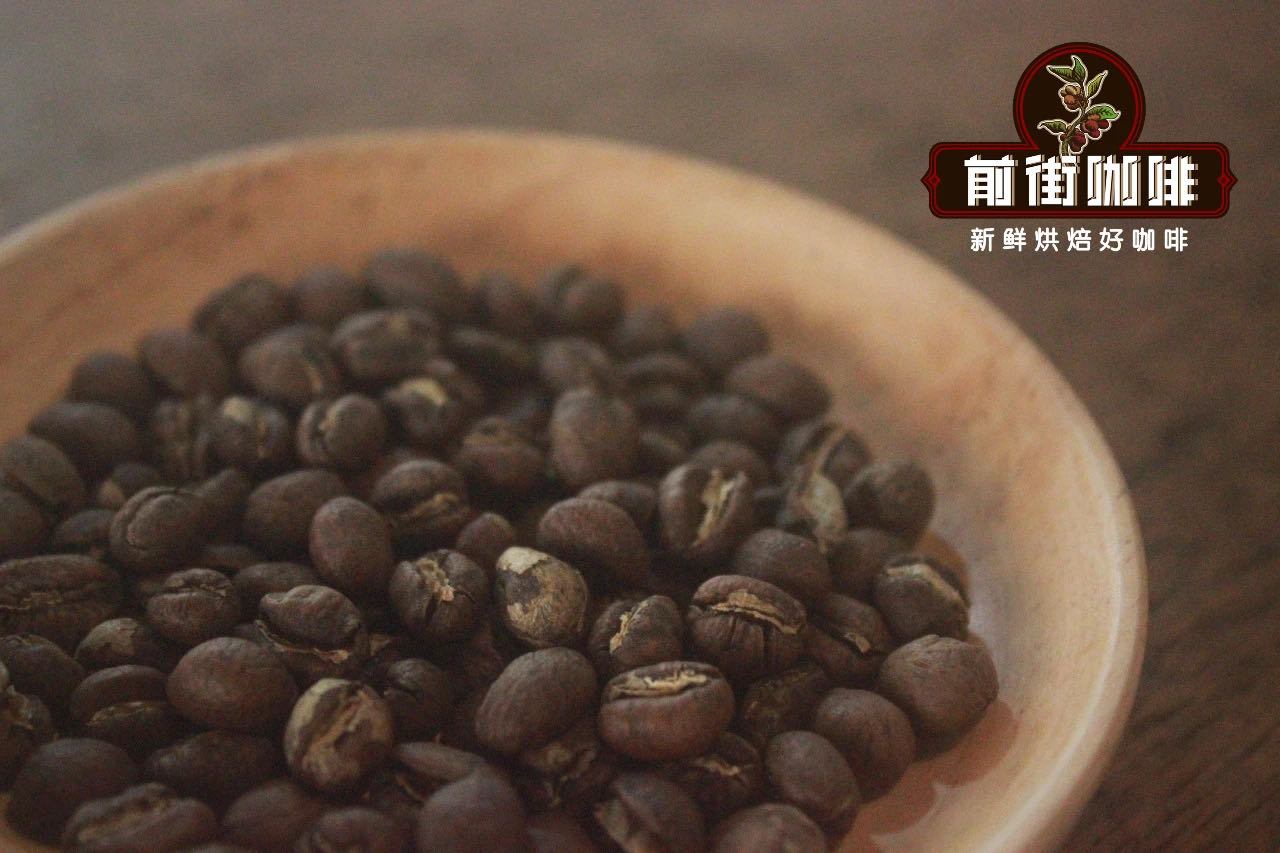
Kenyan coffee bean treatment
The two Kenyan coffee beans sold on Qianjie use the Kenyan 72-hour washing method. Unlike ordinary water washing, Kenyan coffee beans take 72 hours to ferment to make the coffee beans more sour and full. After the coffee was harvested, the best quality coffee fruit was selected, peeled and fermented for 24 hours, and then washed with clean river water after 24 hours. Then, it is fermented again with clean river water for 24 hours, and then washed, so it is repeated 3 times for 72 hours, so it is called Kenyan 72-hour fermentation water washing treatment, referred to as K72. Qianjie believes that K72 treatment can make coffee beans ferment at low temperature for a long time, the acidity will be brighter, but also retain a clean and full flavor!
How can Kenyan coffee beans with such high acidity taste good?
The unique coffee variety, the environmental characteristics of the planting area and the unique Kenyan 72-hour washing method have created an excellent coffee flavor for Kenyan coffee beans. Qianjie recommends using trickle brewing, which is what we often call hand-brewing, to extract coffee.
Filter cup: harioV60, degree of grinding: medium fine grinding (75% of China 20 standard screen), amount of coffee powder 15g, ratio of brewing powder to water 1:15, temperature of brewing water 91 degrees Celsius.
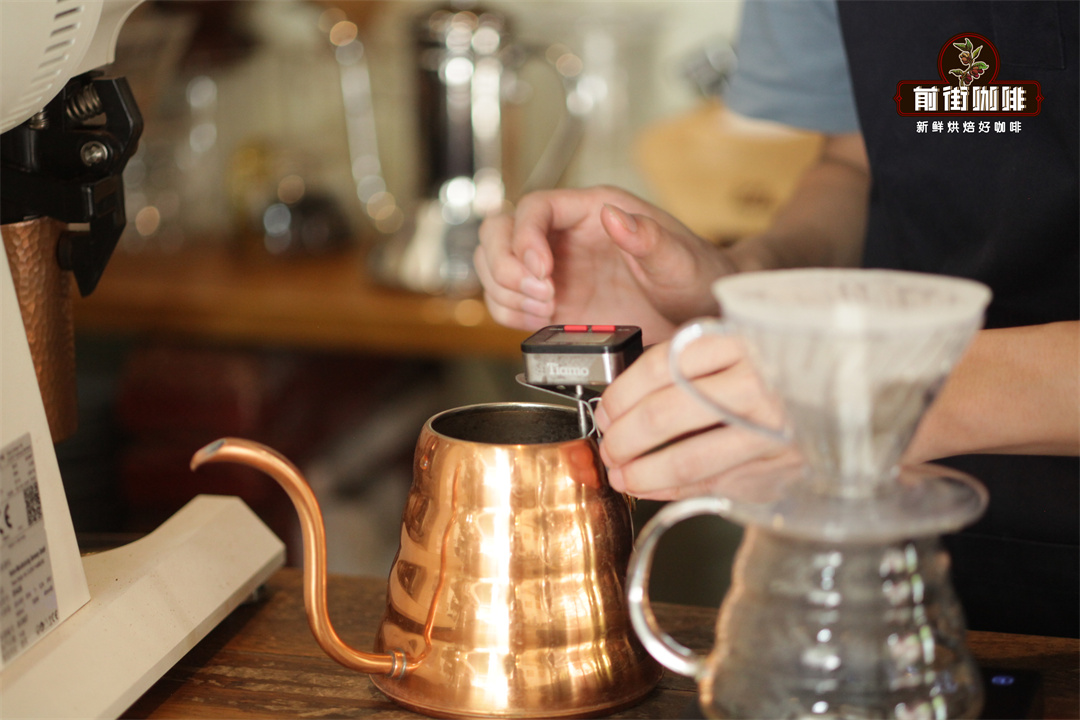
Qianjie recommends three-stage cooking: the first stage injects 30 grams of water for 30 seconds, the second stage injects 95 grams of water (the electronic scale shows 125 grams), about 1 minute completes the injection, and the third stage injects 100 grams of water (225 grams shown by the electronic scale). About 1 minute 45 seconds to complete the injection, the total extraction time is 2 minutes-2 minutes 10 seconds. Remove the filter cup and shake it evenly before tasting.
Kenyan coffee bean brewing flavor: whether it is AA coffee beans or PB round beans, coffee has a very full acidity of berries, such as tomato juice and compound fruit juice, and the aftertaste is as sweet as caramel ~ the flavor is obvious, the acid is bright and clean!
Professional coffee knowledge exchange more coffee bean information please follow the coffee workshop (Wechat official account cafe_style) more boutique coffee beans please add private Wechat Qianjie coffee, WeChat: kaixinguoguo0925
Important Notice :
前街咖啡 FrontStreet Coffee has moved to new addredd:
FrontStreet Coffee Address: 315,Donghua East Road,GuangZhou
Tel:020 38364473
- Prev

An article clarifies the grading system and standard of Kenyan coffee what are the characteristics of Kenyan aa coffee
Professional coffee knowledge exchange more coffee bean information please follow coffee workshop (Wechat official account cafe_style) Kenyan coffee _ Kenyan coffee beans _ Kenyan coffee brand boutique coffee farm production area Kenya coffee grading system is established under the policy of government-led management of quality and guidance to coffee farmers, coffee is an official unit set up by the government after the harvest is completed.
- Next
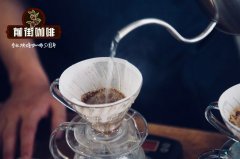
Brazilian coffee beans will have a bumper harvest this year, but their prices have plummeted.
Professional coffee knowledge exchange more coffee bean information please follow coffee workshop (Wechat official account cafe_style) Brazilian coffee flavor characteristics manor producing area _ Brazilian boutique coffee after years of soaring coffee bean prices in Brazil, many cash-rich farmers have expanded their investment in growing coffee beans, but at the time of this year's harvest, coffee beans are expected to have a bumper harvest.
Related
- Detailed explanation of Jadeite planting Land in Panamanian Jadeite Manor introduction to the grading system of Jadeite competitive bidding, Red bid, Green bid and Rose Summer
- Story of Coffee planting in Brenka region of Costa Rica Stonehenge Manor anaerobic heavy honey treatment of flavor mouth
- What's on the barrel of Blue Mountain Coffee beans?
- Can American coffee also pull flowers? How to use hot American style to pull out a good-looking pattern?
- Can you make a cold extract with coffee beans? What is the right proportion for cold-extracted coffee formula?
- Indonesian PWN Gold Mandrine Coffee Origin Features Flavor How to Chong? Mandolin coffee is American.
- A brief introduction to the flavor characteristics of Brazilian yellow bourbon coffee beans
- What is the effect of different water quality on the flavor of cold-extracted coffee? What kind of water is best for brewing coffee?
- Why do you think of Rose Summer whenever you mention Panamanian coffee?
- Introduction to the characteristics of authentic blue mountain coffee bean producing areas? What is the CIB Coffee Authority in Jamaica?

